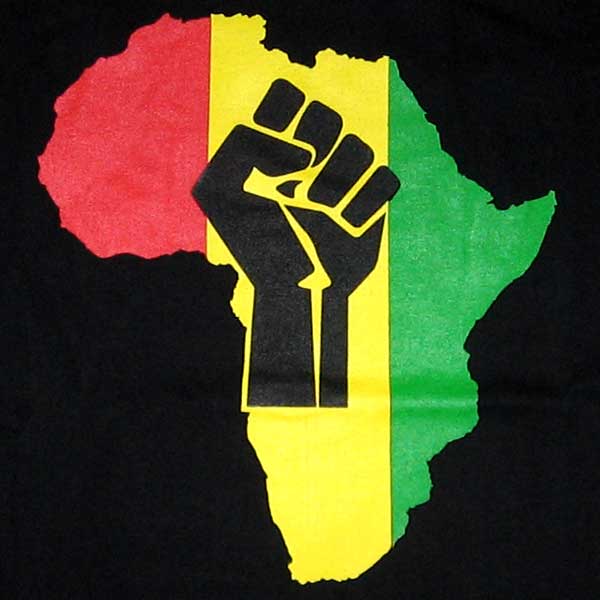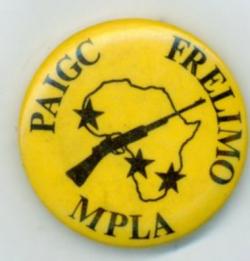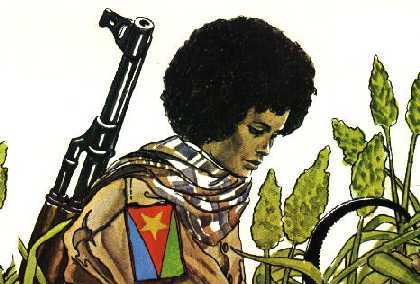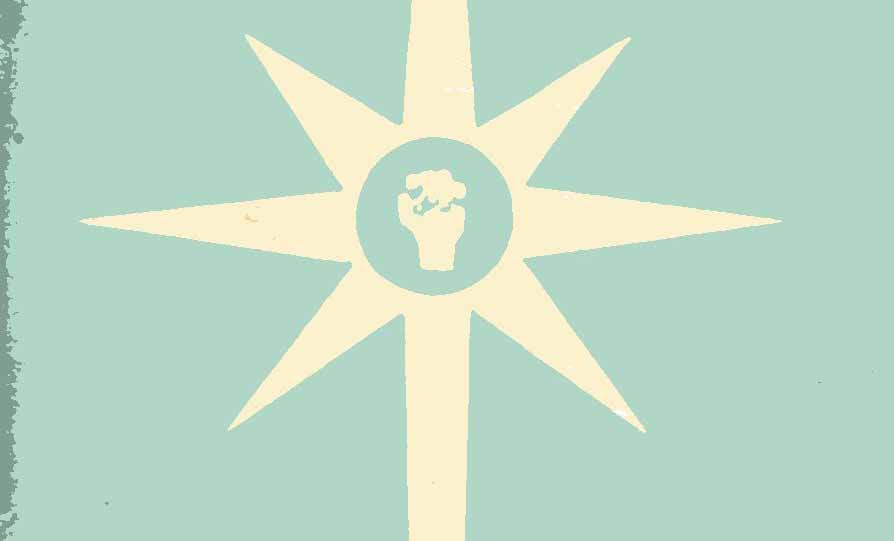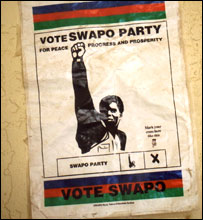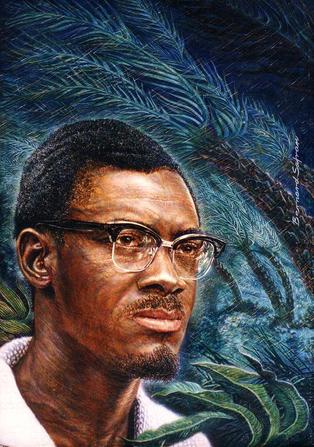African liberation movements
African liberation movements arose from a growing nationalism among previously divided African communities, the unfulfilled promise of self-determination following the end of World War II and the weakened economic and political capacities of Western Europe.
Our collection contains a wide range of materials representing liberation movements from Zimbabwe, South Africa, Namibia, Mozambique, Angola, Guinea-Bissau, Eritrea, and the Congo (DRC). Our collection also features containing Human Rights Reports from South Africa, IKWEZI, a revolutionary Azanian journal, and a sub-collection containing general resources about the continent. This collection includes audio and paper materials.
Strengths of the collection include materials on the role of women in African liberation struggles and national reconstruction, an interesting assortment of periodicals from Southern Africa, speeches and interviews with revolutionary leaders from across the continent, audio from solidarity events in the United States, and a set of human rights reports compiled during the transition from Apartheid to democracy in South Africa.
Our collection contains a wide range of materials representing liberation movements from Zimbabwe, South Africa, Namibia, Mozambique, Angola, Guinea-Bissau, Eritrea, and the Congo (DRC). Our collection also features containing Human Rights Reports from South Africa, IKWEZI, a revolutionary Azanian journal, and a sub-collection containing general resources about the continent. This collection includes audio and paper materials.
Strengths of the collection include materials on the role of women in African liberation struggles and national reconstruction, an interesting assortment of periodicals from Southern Africa, speeches and interviews with revolutionary leaders from across the continent, audio from solidarity events in the United States, and a set of human rights reports compiled during the transition from Apartheid to democracy in South Africa.
Subcollections
-
Africa- General Resources
This collection contains general resources about various themes related to the African continent. The collection draws from many types of materials (periodicals, books, pamphlets) and many different countries (Kenya, Guinea, Tanzania). -
Angola, Guinea-Bissau and Mozambique
This collection contains materials from the liberation struggles in former Portuguese colonies. Guinea Bissau gained independence in 1973 and Mozambique and Angola achieved independence in 1975. -
Anti-Apartheid Solidarity
This collection contains materials from Bay Area anti-apartheid movements of the 1980s originating from various sources, primarily Bay Area-based South African solidarity groups. -
Eritrea
Eritrea is located in the Horn of Africa. It gained its independence from Ethiopia in 1991 after a 30 year struggle for independence. -
IKWEZI
IKWEZI is a revolutionary Azanian Journal based on Marxism-Leninism-Mao Tsetung Thought. -
South Africa
This collection contains a variety of materials which focus on the anti-apartheid movement both within and outside of South Africa. -
South Africa: Human Rights Reports
The Human Rights Commission published weekly, monthly and annual reports. In addition, occasional in-depth special reports were published on important human rights issues. -
SWAPO- Namibia
SWAPO (Southwest Africa Peoples Organization) was formed in 1960 to fight for liberation in present day Namibia. Namibia gained independence from South Africa in 1990. -
Zaire-DRC
This collection contains materials from the Congolese struggle against neocolonialism and the rule of General Mobuto Sese Seko. -
Zimbabwe
This collection contains information about the liberation struggle in Zimbabwe, mainly focused on the struggle against Rhodesia and white settler rule.
Documents
Minister Teurai Ropa Nonor of Zimbabwe speaks about the women’s role in the struggle against imperialism and plans for the redistribution of land to all people, creating a three year education program funded by the government and UNICEF (United Nations Children’s Fund), and how the women of Zimbabwe can get involved in projects, leadership training, and jobs.
In an interview, Joyce Kangai of the ZANU (Zimbabwe African National Union) Women’s League speaks about women’s role in the Zimbabwe liberation struggle and in ZANU women’s league. The women participate fully in the struggle, and raise support for women refugees. The League’s slogan of “Liberation through Participation” is the goal of educating women on politics and the nature of the struggle, recruiting women to participate in the liberation of Zimbabwe, and to work together for equality and raising materials for the women freedom fighters.
Conference on liberation struggles in Africa, particularly Zimbabwe and the Congo. Judy Clark of the ZANU (Zimbabwe African National Union) Women’s League speaks on the ongoing struggle for liberation and reconstruction in Zimbabwe, Namibia, South Africa, and Congo. The ZANU Women’s League raises support for women fighting for liberation and equality. Serge Mukendi of the FLNC (Congolese National Liberation Front) speaks on the history of the struggle for independence in the Congo, and calls the people to fight for liberation against white colonialist structures. Judy Clark again speaks on the legacy and power of Patrice Lumumba in the continuing struggle for liberation in the Congo. Alajo Adegbalola, Minister of Defense for the Provisional government of the RNA (Republic of New Africa), speaks on the importance of the unity of the RNA in fighting for liberation in Africa. He also speaks on the history of black person’s struggle in America and the Civil Rights Movement.
Call Number: AFR 040Format: Cass A & BProducers: WBAIProgram: WBAI African Liberation Day Special ProgramCollection: Africa- General Resources
A WBAI radio program recorded in 1997. African Historian John Henrik Clarke, Historian and Temple University African American Studies Professor Dr. Molefi Kete Asante, and Syracuse University African American Studies Professor Horace Campbell discuss the African tradition and history in the United States. They speak about the forced migration of Africans to
America, the history and injustices of slavery and the development of African consciousness.
Recorded off mic.
ZANU representatives interview two women from South Africa about education in South Africa. The South African women from Soweto speak about the lack of education for children in South Africa, especially those from the townships. Recording breaks abruptly into a French radio program on the Congo, recorded in French.
Side B is a continuation of French radio program.
Judy Jensen of the Material Aid Campaign for ZANU makes a speech about Southern Africa. She speaks about ZANU’s defeat of white settler colonialism in Zimbabwe and also women’s contributions to the struggle. She discusses the different fronts in the war for the liberation of Southern Africa, and the struggle against the US’s attack on their independence. She talks about struggles in Namibia, South Africa’s control over Southern African countries, and calls for solidarity with Southern African countries. Lastly, she draws comparisons and similarities between the oppression of blacks in America and Africa. Next, Serge Mukendi, US Representative of the Workers and Peasants Movement of the Congo (MOP), speaks about weaknesses in natural and human resources in Africa because they are not in the hands of the Africans. He speaks about the struggles in Congo and tells the audience that it is our duty to strengthen the fight for liberation in Congo through support and solidarity.
On Side B, Eve Rosahn, political activist, Students Against Government Misconduct, speaks about political activists for black liberation who have been tortured and beaten for their actions. Next, a member of the Anti-Springbok 5 chants “Up With Azania, Down With South Africa!”, and speaks about her experiences as an ASB-5, and tells the audience about the Springbok 5 and what they represent. The Springboks are an elite white supremacist South African rugby team traveling the US, representing the spread of white imperialism. Lastly, PAC (Pan African Congress) representative Jackie Mazibuko, speaks about white alliances between Ian Smith of Zimbabwe, the South African government, and the US in their oppression of black Africans. She also speaks about the land issues in Africa, and that all land originally, and still should, belong to black Africans, and that people must have the ideology of revolution to struggle against oppression.
Amilcar Cabral, leader of PAIGC - Liberation Movement of Guinea-Bissau/Cape Verde Islands. speaks at a conference of African-American organizations and journalists in New York. Cabral’s portions of Cabral's comments are in his book “Return to the Source."
Cabral was assassinated by the CIA and Portuguese colonialists in 1973.
NOTE: an excerpt from this tape is on Roots of Resistance, Volume 1, highlights CD.
Publisher: Official Organ of the South West Africa People\\\'s OrganisationYear: 1981Volume Number: Vol 5. No. 2/3Format: PeriodicalCollection: SWAPO- Namibia
Official Organ of the South West Africa People\\\'s Organisation
Contains a wealth of information which provides insight into what sort of Namibia would unfold under SWAPO\'s leadership.
Publisher: Chicago Committee for African LiberationDate: 8/26/1977Volume Number: 26-AugFormat: MonographCollection: SWAPO- Namibia
Monograph containing two interviews with Namibian women.

